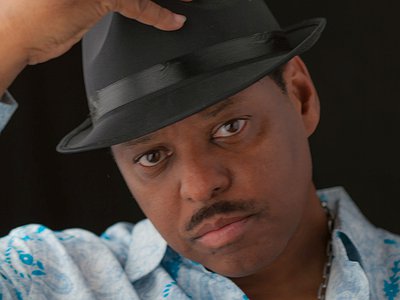Could you describe your creative process on the basis of a piece or album that's particularly dear to you, please? Where did the ideas come from, how were they transformed in your mind, what did you start with and how do you refine these beginnings into the finished work of art?
Let's take my new release Kaleidoscope as an example … “Kaleidoscope” was born out of a collaboration between me and my current writing partner Dani Ivory. I move back-and-forth between Los Angeles and Las Vegas and at the time I was living in Vegas. My usual routine is to spend at least a few days in Los Angeles going to the beach, my favorite restaurants and getting some writing sessions in. On this particular day Dani was back from touring with the many bands that she has toured with including Beyonce, Imagine Dragons and currently Rhye.
I start the process out by coming up with a drum progression and then crafting a baseline over it. Danny usually plays her idea of chord structure on top and then we both will come up with a progression that feels right. Once we have the basic rhythm section and progressions of the song, I'll then go in and add some DJ friendly items such as percussion sound effects and structure.
We usually end the session here. Then I take the next day to come up with a melody for the lyrics and song itself. On this particular occasion, I came up with a melody and the 1st verse of lyrics, which eventually became more like the bridge and chorus. I tend to hum melodies and feel words while I'm humming the melody that may or may not have anything to do with the song once it's completed. I use these more as a holding place so that the song structure, rhythm, rhyme and timing will all be in sync. I then sent those ideas over to Dani who completed the lyrics for the rest of the song. Dani is not only an amazing pianist, but as you hear has an angelic voice. When we first started writing I would give her a lot more structure and guidance. But by the time we were writing “Kaleidoscope”, I just let her go for it. Obviously what she came up with has turned out to be an amazing, melodic, lyrically gifted song.
There are many descriptions of the ideal state of mind for being creative. What is it like for you? What supports this ideal state of mind and what are distractions? Are there strategies to enter into this state more easily?
My ideal state of mind for writing is anytime, anywhere the mood hits me. Writing songs that is. But usually I'm in my car listening to the track that I created over and over and over and over again. A melody has to weave within the chord structure of a song. Perhaps this is why many songs may lack enduring melody when they don't have chord structure or progressions.
When it comes to writing a book or a script, I need to be in a place that's quiet with no distractions. That contrast is very interesting to me, because it seems that the chaos of life drives me to write songs, but the peace and tranquility of life drives me to write life situations.
I'm not very easily distracted, because I'm very good at tuning things out - especially people lol. I have control over where my mind goes and how it interprets. There is an exception - my spirit is constantly receiving inspiration and guidance ...
How is playing live and writing music in the studio connected? What do you achieve and draw from each experience personally? How do you see the relationship between improvisation and composition in this regard?
My mind has always operated as a movie film or music video. The lyrics I write and the melodies are generally in sync with a particular situation or scene that I am creating and remixing in my mind..
Playing live brings a real element into the mix. You only get one time to perform in front of an audience, but you can record and do as many takes as you like until you find the right one when you're in the studio. Blending these two ideals together takes a very distinct sense of timing and understanding. If you don't know your audience, then you will never know what playing your song or track in front of them will bring. Having been in the business as long as I have, I know what makes an audience react so that is what I bring into the studio.
How do you see the relationship between the 'sound' aspects of music and the 'composition' aspects? How do you work with sound and timbre to meet certain production ideas and in which way can certain sounds already take on compositional qualities?
Composition is a necessary evil. I'm sure most writers if they had their way would just play and feel things by ear. When I first started my career, although having music composition and theory lessons up until that point, it was my ear that actually guided me in the right direction. But I heed this warning to up-and-coming writers and producers - be very careful how you navigate the two. I see the biggest problem with most of the music that's being put out there today as there is no joining of composition and the sound of it or playing and putting things together by ear.
When you find production techniques that work for you use them as your guide in all of your future compositions. That's how you can distinctly differentiate one writer or producer from the next. They all have their own sound. They know what works and what doesn't.
Different songs and genres generally require different types of sounds and timbres. You can take a sound from one genre and use it in another by bending the pitch or sliding the note. Quarter notes versus 8th notes versus whole notes etc., also help define your composition.
Understanding sounds, tones and notes, whether it's a drum sound or melodic one, will give you insight how to use them. There is no limit to creativity so any sound can become part of your composition. Only you can say what part that is and what the outcome will be.
Our sense of hearing shares intriguing connections to other senses. From your experience, what are some of the most inspiring overlaps between different senses - and what do they tell us about the way our senses work? What happens to sound at its outermost borders?
I listen with not only my ears but my eyes, my spirit, and my body. My body reacts to certain sounds, especially bass, but also mids and highs. As an engineer I need to feel the whole spectrum of the song, but especially the pulse of the track which are the lower spectrum of the frequencies. The highest spectrum of the frequencies give clarity, while the mid sections are the most audible. If your ears are hurting while listening to music it is the mid frequencies that are doing it.
Too many DJs, producers and engineers play music too loud. This harms your hearing over time and gives you a false sense of what music or sound in general sounds like. The ideal listening level in the studio is a volume that is low enough to hear every sound that you have in your mix. The only time I recommend turning the volume up is when you are comparing to another song and you need to feel the pulse of it.
All of our senses are made to be in synch with each other. If one sense is lacking, then another sense is trying to compensate. This works for pretty much everything in life that is harmonious.
Art can be a purpose in its own right, but it can also directly feed back into everyday life, take on a social and political role and lead to more engagement. Can you describe your approach to art and being an artist?
My approach to art is harnessing everything that happens around me, mixing it in my head and outputting it with love, understanding and appreciation for life itself. I love the most beautiful things of life, the water the mountains, the sky, the trees, the plants and the land we live on. I'm a hippie at heart, so everything I do is in a positive light.
It is remarkable, in a way, that we have arrived in the 21st century with the basic concept of music still intact. Do you have a vision of music, an idea of what music could be beyond its current form?
Music has been a part of each and every one of our lives the world over since the beginning of time. Since the days of ancient Egypt when they made instruments out of wood, animal skin and any other type of object they could carve to blow into or beat on, we have relied on it as the timestamp of our lives! Music sets or changes your mood, your instincts your cravings. It can make you smile, it can make you sad, it can make you reminisce and yearn for those days of great memories in your life.
The only thing that has changed since then is the quality of the mechanism that we use to make it. Therefore, music will never change, and its effect on the world will only change in its way of creating, playing and using it. What that will be, I couldn't tell you. I never imagined when I was in my Grandmother's basement back in the early eighties, that technology would get to a place where we didn't have to have a turntable (record player) to place a record on and a needle to grasp and hear the audio tones that come from it! CD players, MP3 players, Digital wav forms ...YOU tell me what's next?



